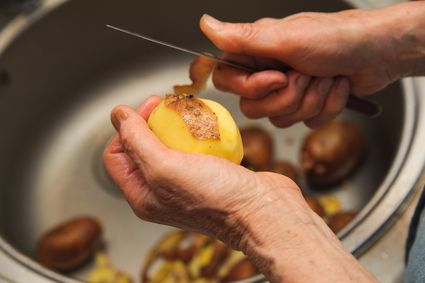Cooking Safety Tips for Family Members with Dementia
Keep your loved one with dementia safe in the kitchen with these practical and important tips. Learn how to prevent fires and accidents, and how to adapt cooking tasks to your family member's changing abilities.

Caring for a family member with dementia requires special attention to their safety, especially in the kitchen where potential hazards can be life-threatening. Cooking, an activity of daily living we often take for granted, becomes challenging for individuals with dementia. Nutritional decline and safety risks increase, making it essential for caregivers to implement measures that promote independence while ensuring their loved one's well-being.
Recognize the Need for Assistance:
The first step in ensuring cooking safety for someone with dementia is to observe and identify any signs of forgetfulness or confusion in the kitchen. As the disease progresses, your loved one may need more assistance with meal preparation.
Install Safety Devices:
To prevent accidents, install smoke detectors and heat sensors in the kitchen and check their batteries regularly. A gas detector is advisable if you use gas appliances. Opt for an electric range over a gas stove to reduce the risk of gas-related incidents.
Supervise with Care:
Allowing the person with dementia to cook can be a source of joy and fulfillment for them. However, it is crucial to supervise their cooking activities closely to prevent accidents. Offer assistance when needed, and consider introducing adaptive equipment to support simple tasks.

Set Up Safety Systems:
Implement safety systems in the kitchen to reduce potential hazards. For example, consider installing an automatic stove shut-off device that turns off the stove after a certain period of inactivity.
Simplify the Cooking Process:
As dementia progresses, simplify the cooking process by preparing pre-cut ingredients and organizing cooking tools in an accessible manner. This will enable your loved one to engage in cooking while minimizing the risk of accidents.
Promote Self-Esteem and Well-Being:
Encourage your family member to participate in cooking to maintain a sense of independence and self-esteem. Simple tasks like stirring or pouring ingredients can provide them with a sense of accomplishment and joy.
Seek Professional Advice:
Consult with healthcare professionals or occupational therapists who specialize in dementia care. They can provide tailored advice on adapting the kitchen environment and suggest appropriate strategies to enhance safety.
Conclusion:
Caring for a family member with dementia requires diligence and understanding, especially when it comes to cooking safety. By paying attention to their changing abilities, implementing safety measures, and providing appropriate support, you can promote their well-being while preserving some of their independence in the kitchen. Remember, safety is paramount, and seeking professional guidance will ensure you create a secure environment for your loved one.





